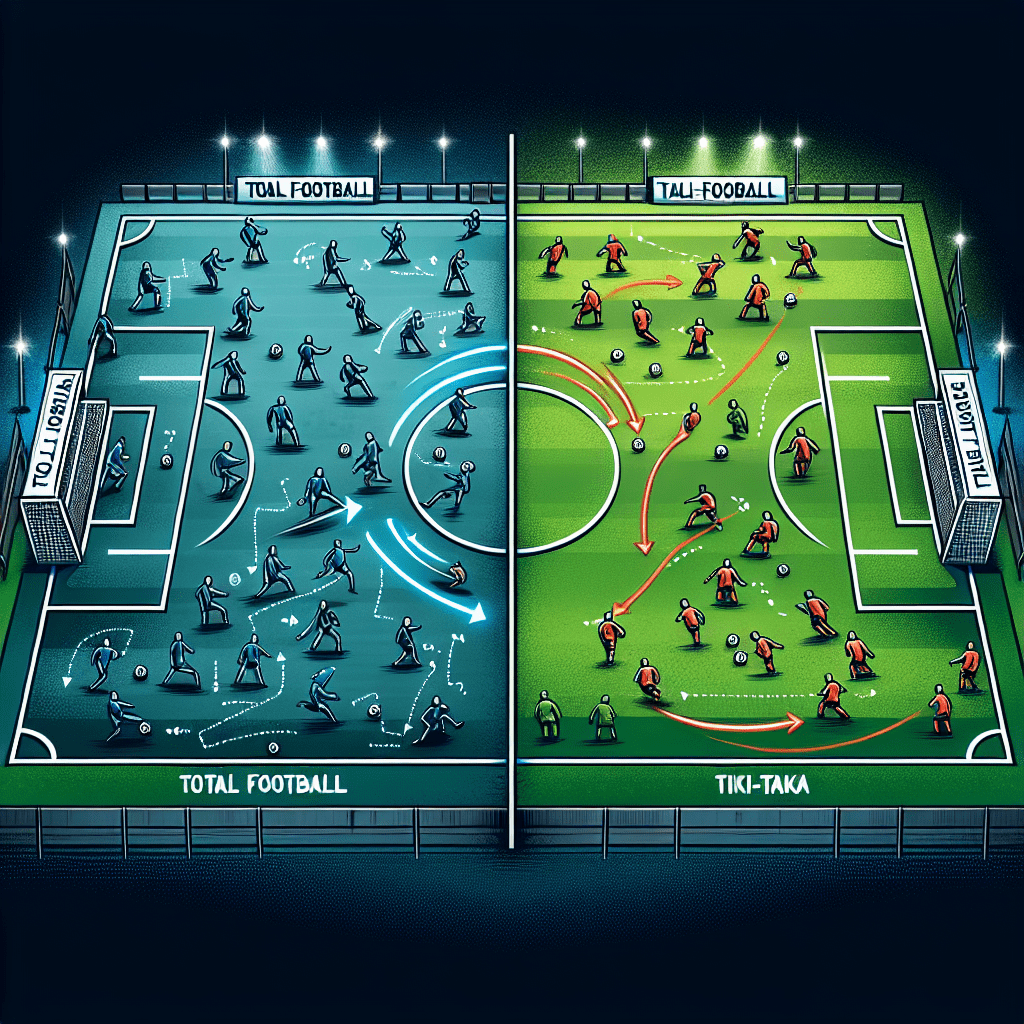[ad_1]
From Total Football to Tiki-Taka: How Coaching Philosophies Shape the Game of Soccer
Soccer, or football as it is known outside of the United States, is not just a game; it is a reflection of culture, politics, and history, all playing out on a grassy canvas. It is a sport where strategy and philosophy are not just footnotes but the very foundation upon which success is built and legacies are cemented. Two of the most influential coaching philosophies that have shaped modern soccer are Total Football and Tiki-Taka. These approaches to the game have not only led teams to victory but have also inspired countless fans and future generations. This article explores how these philosophies came to be, their impact on the game, and the lessons that can be learned from their evolution.
Total Football: The Dutch Revolution
Total Football is a tactical theory in soccer where any outfield player can take over the role of any other player in the team. It is a fluid system where players switch positions seamlessly, making it difficult for opponents to mark them. This system requires all players to be highly skilled in multiple positions and to have a deep understanding of the game.
Originating in the late 1960s and reaching its zenith in the 1970s, Total Football was most famously used by the Dutch national team and Ajax Amsterdam under the guidance of coach Rinus Michels and later on by Johan Cruyff. The Netherlands’ teams of this era were known for their incredible skill, teamwork, and tactical flexibility – embodying the principle that the team’s collective effort was more important than individual brilliance.
Total Football’s Impact
The influence of Total Football on the modern game cannot be overstated. It challenged the traditional, rigid forms of play and showed that adaptability, creativity, and technical excellence could lead to success. Teams became more tactically aware and started to value players who were versatile. It also sparked conversations about the aesthetic value of soccer, as the style of play promoted by the Dutch was not only effective but beautiful to watch.
Tiki-Taka: Mastery Through Possession
Tiki-Taka is a style of play in soccer characterized by short passing and movement, maintaining possession, and working the ball through various channels. It is a methodical system that requires patience, precise timing, and players with a high level of technical skill and tactical awareness.
This philosophy became world-renowned through the Spanish national team and FC Barcelona in the late 2000s and early 2010s, especially under coaches like Pep Guardiola. Tiki-Taka is centered on the idea of dominating the game through superior ball control, minimizing the opponent’s opportunities to score by limiting their possession of the ball.
Tiki-Taka’s Influence
Tiki-Taka has had a profound effect on soccer, emphasizing the importance of possession, teamwork, and a proactive approach to the game. It has shown that control and patience can be just as dominant as speed and physicality. Clubs and national teams around the world have adopted elements of Tiki-Taka, seeking to replicate the success of Guardiola’s Barcelona and the Spanish national team of 2008-2012.
Moreover, Tiki-Taka has contributed to a greater appreciation of the midfield’s role in building attacks and controlling the pace of the game. Players who excel in passing, vision, and movement become central to a team’s success, elevating the status of the cerebral playmaker.
The Evolution of Soccer Philosophies
The evolution from Total Football to Tiki-Taka and beyond highlights soccer’s dynamic nature. Each philosophy builds on the lessons of the past while adapting to the changing landscape of the sport. Teams now recognize the need to be versatile, capable of dominating possession like Tiki-Taka teams or utilizing the fluidity and positional interchanges of Total Football.
FAQs
What is the main difference between Total Football and Tiki-Taka?
The main difference lies in their tactical focus. Total Football emphasizes positional fluidity and versatility, allowing players to interchange positions freely. Tiki-Taka, on the other hand, focuses on maintaining possession through short passes and movement, emphasizing control over the game.
Can Total Football and Tiki-Taka be effectively combined?
Yes, aspects of Total Football and Tiki-Taka can be combined. A team could use the positional fluidity of Total Football to create spaces and opportunities, while adopting the Tiki-Taka approach of maintaining possession and controlling the pace of the game.
How have these philosophies influenced modern soccer tactics?
Modern soccer tactics have been heavily influenced by the emphasis on versatility, technical skill, and tactical awareness seen in Total Football and Tiki-Taka. Teams strive for a balanced approach, incorporating elements of possession, pressing, and flexibility.
Who are some key figures associated with Total Football and Tiki-Taka?
For Total Football, Rinus Michels and Johan Cruyff are the most notable figures. Tiki-Taka is closely associated with Pep Guardiola and players like Xavi Hernandez, Andres Iniesta, and Lionel Messi.
What is the future of soccer tactics and philosophies?
Soccer tactics and philosophies will continue to evolve as coaches experiment with new strategies and adapt to changes in the game. The future may see a blend of existing philosophies with innovative approaches, as the sport continues to grow and develop globally.
In conclusion, the philosophies of Total Football and Tiki-Taka have shaped the game of soccer in profound ways, influencing tactics, coaching, and how the sport is played and appreciated worldwide. As soccer continues to evolve, the legacy of these philosophies will endure, inspiring new generations of players and coaches to think creatively and embrace the beautiful game’s strategic depth.
[ad_2]






